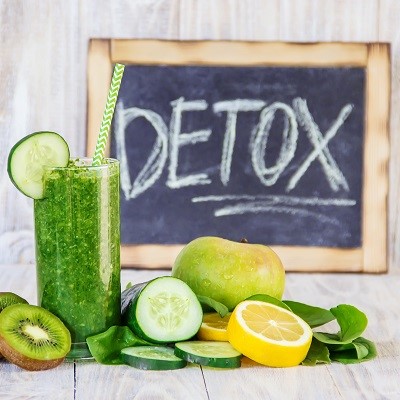 Detoxification or detox diets are very popular these days, but are they really necessary? What health benefits do they offer? Before answering those questions, let’s find out more about detox diets.
Detoxification or detox diets are very popular these days, but are they really necessary? What health benefits do they offer? Before answering those questions, let’s find out more about detox diets.
Advocates of detox or cleansing diets promote them as a way to remove accumulated toxins from the body.
Normal metabolic functions produce waste by-products like ammonia and lactic acid. Toxins can also enter the body from food, water and air.
The body has natural ways to neutralize and eliminate toxins. This process is called detoxification. The liver, kidneys, skin, lungs and intestines work together to filter toxins and excrete them from the body.
The body’s natural detoxification processes may become impaired as a result of exposure to too many toxins. A detox diet is a special diet program aimed at eliminating dietary and environmental toxins from the body.
How to Do a Detox
Detoxification is typically done by reducing the amount of potentially harmful chemicals ingested in food. Eating wholesome organic foods is one way to avoid pesticides, preservatives and artificial sweeteners in many foods today.
A detox diet also emphasizes the consumption of nutritious foods like fruits and vegetables that are high in fiber, nutrients and antioxidants. High fiber foods absorb toxins and promote frequent bowel movements and urination to help eliminate toxins.
Detox diets vary, but they are often done over a short period of time. Typical detoxification programs last from 3 to 7 days. Detox usually starts with fasting followed by a diet of fruits, vegetables, or juices. Herbal supplements are sometimes used to help cleanse the colon.
Benefits of Detox Diets
A detox diet can increase your energy levels and improve your concentration. Some people say a detoxification program helps make their skin clearer and improves their overall well being. A cleansing diet can also relieve indigestion, headache and muscle pain.
Are Detox Diets Necessary?
There is no scientific evidence to support the health benefits of detoxification. There is also little evidence that detox diets are capable of removing toxins from the body. The colon, liver and kidneys are very effective cleansing organs and can eliminate most toxins from the body.
As long as you continue to eat a healthy diet, drink plenty of water and exercise regularly, your body should be able to cope just fine.
What about the testimonies of people who experienced improved health and energy after a detox? Most likely, the benefits they experienced are the result of eliminating sugar, saturated fats and highly processed foods in their diet. This is key to getting and keeping a healthy body.
Safety Concerns
If you’re planning to go on a detox diet, be sure to consult your doctor or a qualified health personnel first.
Many cleansing diets require fasting, which can lead to fatigue. Detoxification diets often severely limit protein intake. Long-term fasting can cause nutritional deficiencies. Most detox plans include colon cleansing which can result in dehydration, abdominal cramps, headaches and nausea.
Keep in mind that the best way to keep your body healthy and functioning at optimal levels is eat a nutritious, balanced diet rich in fruits, vegetables, whole grains and lean protein.






